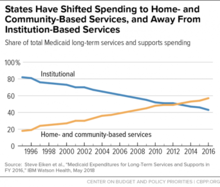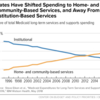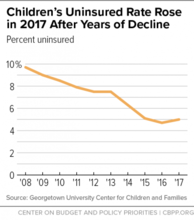0
Publication
Community:
Jan 18, 2019
The State of Arizona’s Medicaid agency (AHCCCS) recognizes the vital importance of safe, decent and affordable housing to health. With a portfolio of over 3,000 units of affordable housing for Medicaid members with a determination of serious mental illness (SMI) and/or substance use disorder, housing is a major component of how the State of Arizona assists those trying to recover and stabilize.
Authored by: Josh Crites for The Journal of Housing & Community Development
Topics: Health, Housing, Low-income, Medicaid / Medicare, Partnerships, Place-based
 Shared by Mica O'Brien
Shared by Mica O'Brien
Mica O'Brien posted a
on Feb 7, 2019
Josh Crites for The Journal of Housing & Community Development
The State of Arizona’s Medicaid agency (AHCCCS) recognizes the vital importance of safe, decent and affordable housing to health.
0
Interactive
Community:
Jan 30, 2019
Medicaid helps low-income seniors, children, people with disabilities, and families get needed health care. Medicaid coverage improves families’ financial security by protecting them from medical debt and helping them stay healthy for work. Medicaid coverage also has long-term health, educational, and financial benefits for children. Click on the map to learn more about Medicaid’s contributions to your state.
Authored by: Matt Broaddus for the Center on Budget and Policy Priorities
Topics: Child welfare, Health, Legislation & Policy, Low-income, Medicaid / Medicare, Research
 Shared by Housing Is
Shared by Housing Is
Housing Is posted a
on Jan 30, 2019
Matt Broaddus for the Center on Budget and Policy Priorities
Medicaid helps low-income seniors, children, people with disabilities, and families get needed health care. Medicaid coverage improves families’ financial security by protecting them from medical debt and helping them stay healthy for work.
0
News Article
Community:
Jan 25, 2019
A whole host of factors — such as friends, housing and transportation — affect a person’s health and how much they need the social safety net. It’s time the government’s big health insurance programs took this reality into account, some lawmakers and policymakers are starting to argue.
Authored by: Paige Winfield Cunningham for The Washington Post
Topics: Asset building, Cost effectiveness, Disabilities, Education, Food insecurity, Funding, Health, Homelessness, Housing, Legislation & Policy, Low-income, Medicaid / Medicare, Seniors, Transportation, Workforce development
 Shared by Housing Is
Shared by Housing Is
Housing Is posted a
on Jan 25, 2019
Paige Winfield Cunningham for The Washington Post
A whole host of factors — such as friends, housing and transportation — affect a person’s health and how much they need the social safety net. It’s time the government’s big health insurance programs took this reality into account, some lawmakers and policymakers are starting to argue.
0
Research
Community:
Mar 1, 2018
Medicaid coverage reduced the prevalence of undiagnosed depression by almost 50% and untreated depression by more than 60%. It increased use of medications and reduced the share of respondents reporting unmet mental health care needs by almost 40%.
Authored by: Katherine Baicker, Heidi Allen, Bill Wright, Sarah Taubman, and Amy Finkelstein for Milbank Memorial Fund
Topics: Depression, Low-income, Medicaid / Medicare, Mental health, Metrics, Pacific Northwest, Research
 Shared by Mica O'Brien
Shared by Mica O'Brien
Mica O'Brien posted a
on Jan 24, 2019
Katherine Baicker, Heidi Allen, Bill Wright, Sarah Taubman, and Amy Finkelstein for Milbank Memorial Fund
Medicaid coverage reduced the prevalence of undiagnosed depression by almost 50% and untreated depression by more than 60%. It increased use of medications and reduced the share of respondents reporting unmet mental health care needs by almost 40%.
0
Publication
Community:
Jun 15, 2018
Delegates at the 2018 American Medical Association Annual Meeting in Chicago adopted several policies intended to alleviate chronic homelessness and racial housing segregation
Authored by: Sara Berg for the American Medical Association
Topics: Health, Homelessness, Low-income, Medicaid / Medicare, Partnerships
 Shared by Mica O'Brien
Shared by Mica O'Brien
Mica O'Brien posted a
on Jan 22, 2019
Sara Berg for the American Medical Association
Delegates at the 2018 American Medical Association Annual Meeting in Chicago adopted several policies intended to alleviate chronic homelessness and racial housing segregation
0
News Article
Community:
Jan 18, 2019
The State of Arizona’s Medicaid agency (AHCCCS) recognizes the vital importance of safe, decent and affordable housing to health. With a portfolio of over 3,000 units of affordable housing for Medicaid members with a determination of serious mental illness (SMI) and/or substance use disorder, housing is a major component of how the State of Arizona assists those trying to recover and stabilize.
Authored by: Josh Crites for The Journal of Housing & Community Development
Topics: Cost effectiveness, Health, Housing, Low-income, Medicaid / Medicare, Mental health, Partnerships, Substance abuse
 Shared by Housing Is
Shared by Housing Is
Housing Is posted a
on Jan 22, 2019
Josh Crites for The Journal of Housing & Community Development
The State of Arizona’s Medicaid agency (AHCCCS) recognizes the vital importance of safe, decent and affordable housing to health.
0
News Article
Community:
Dec 27, 2018
The nation’s public housing authorities are seeking closer links to health insurers and medical care providers to address social determinants of health.
Authored by: Bruce Japsen for Forbes
Topics: CLPHA, Funding, Health, Housing, Low-income, Medicaid / Medicare, Partnerships, Place-based, Research
 Shared by Mica O'Brien
Shared by Mica O'Brien
Mica O'Brien posted a
on Jan 7, 2019
The nation’s public housing authorities are seeking closer links to health insurers and medical care providers to address social determinants of health.
0
Case study
Community:
Dec 6, 2018
The Denver Housing Authority (DHA) wins a 2017 Award of Excellence in Client and Resident Services for creating the Health Navigators (HN) program, which provides mental health education, resources, and doctor referrals.
Authored by: Ashanti Wright for Journal of Housing & Community Development
Topics: Disabilities, Health, Housing, Low-income, Medicaid / Medicare, Mental health, Partnerships, Place-based, Seniors
 Shared by Mica O'Brien
Shared by Mica O'Brien
Mica O'Brien posted a
on Dec 21, 2018
Ashanti Wright for Journal of Housing & Community Development
The Denver Housing Authority (DHA) wins a 2017 Award of Excellence in Client and Resident Services for creating the Health Navigators (HN) program, which provides mental health education, resources, and doctor referrals.
0
Report
Community:
Dec 1, 2018
The conditions in which people live, learn, work, and play affect health in myriad ways. State Medicaid agencies are increasingly exploring opportunities to address these social determinants of health (SDOH) in an effort to provide more efficient care and improve health outcomes. As states begin to support these efforts, they are thinking strategically about how best to align SDOH-related activities with other reforms — such as value-based purchasing, care transformation, and the development of cross-sector partnerships.
Authored by: Center for Health Care Strategies, Inc.
Topics: Health, Low-income, Medicaid / Medicare
 Shared by Housing Is
Shared by Housing Is
Housing Is posted a
on Dec 19, 2018
Center for Health Care Strategies, Inc.
The conditions in which people live, learn, work, and play affect health in myriad ways. State Medicaid agencies are increasingly exploring opportunities to address these social determinants of health (SDOH) in an effort to provide more efficient care and improve health outcomes.
0
Report
Community:
May 1, 2018
Housing and health systems need to work together. Public housing authorities (PHAs) are significant providers of housing to those in need, offering the health sector scale and expertise. Little was known about how PHAs worked with the health sector writ large. With a national survey, we found that PHAs across the country are engaged in a wide range of partnerships with different health organizations that address various target populations and health priorities. Barriers to housing-health collaboration, such as funding and staffing capacity, can be overcome with cross-system partnerships that seek to address these needs.
Authored by: CLPHA and PAHRC
Topics: Child welfare, Funding, Health, Housing, Low-income, Medicaid / Medicare, Partnerships, Preventative care, Research, Seniors, Smoke-free
 Shared by Housing Is
Shared by Housing Is
Housing Is posted a
on Dec 19, 2018
Housing and health systems need to work together. Public housing authorities (PHAs) are significant providers of housing to those in need, offering the health sector scale and expertise. Little was known about how PHAs worked with the health sector writ large.
0
Publication
Community:
Dec 17, 2018
In response to the heightened interest in the relationship between work and the health of individuals and communities, CMCS has clarified that Medicaid funds cannot be used to pay beneficiaries’ wages, but can pay for employment counseling as an optional benefit—to help people get jobs. Years of experience with work requirements for the Supplemental Nutrition Assistance Program, Aid to Families with Dependent Children, and populations with disabilities have developed the evidence for what is needed to help different populations find and keep jobs.
Authored by: Christopher F. Koller for Millbank Memorial Fund
Topics: Affordable Care Act, Disabilities, Health, Legislation & Policy, Low-income, Medicaid / Medicare, Research, Stability, Workforce development
 Shared by Mica O'Brien
Shared by Mica O'Brien
Mica O'Brien posted a
on Dec 17, 2018
Christopher F. Koller for Millbank Memorial Fund
In response to the heightened interest in the relationship between work and the health of individuals and communities, CMCS has clarified that Medicaid funds cannot be used to pay beneficiaries’ wages, but can pay for employment counseling as an optional benefit—to help people get jobs.
0
Publication
Community:
Dec 14, 2018
Health and reentry are closely related, and chronic medical, mental health, and substance use problems make it harder for newly released people to seek employment, obtain housing, and avoid reincarceration. Compared with the general population, justice-involved people tend to be in poorer health and need access to physical and behavioral health services, as well as the know-how and motivation to get care.
Authored by: Rochisa Shukla and Kamala Mallik-Kane for Urban Institute
Topics: Affordable Care Act, Criminal justice, Health, Legislation & Policy, Low-income, Medicaid / Medicare, Research, Stability
 Shared by Mica O'Brien
Shared by Mica O'Brien
Mica O'Brien posted a
on Dec 14, 2018
Rochisa Shukla and Kamala Mallik-Kane for Urban Institute
Health and reentry are closely related, and chronic medical, mental health, and substance use problems make it harder for newly released people to seek employment, obtain housing, and avoid reincarceration.
0
Publication
Community:
Dec 1, 2018
Using a two-generation (2Gen) framework, Medicaid can be designed to support the social capital, health and well-being, educational attainment, and economic security of children and families, together, so they can maximize their health and thrive. This checklist outlines specific Medicaid policies and design choices adopted in Colorado to implement a 2Gen approach to improve the lives of children and families.
Authored by: Gretchen Hammer for Ascend: The Aspen Institute
Topics: Dual-generation, Early childhood, Family engagement, Health, Low-income, Medicaid / Medicare
 Shared by Mica O'Brien
Shared by Mica O'Brien
Mica O'Brien posted a
on Dec 13, 2018
Gretchen Hammer for Ascend: The Aspen Institute
Using a two-generation (2Gen) framework, Medicaid can be designed to support the social capital, health and well-being, educational attainment, and economic security of children and families, together, so they can maximize their health and thrive.
0
Report
Community:
Oct 17, 2018
Prioritizing young children in Medicaid through cross-sector, innovative practice change has the potential to improve their lifetime trajectories, overall population health and long-run savings.
Authored by: Elisabeth Wright Burak for Georgetown University Health Policy Institute: Center for Children and Families
Topics: Child welfare, Early childhood, Health, Low-income, Medicaid / Medicare, Research
 Shared by Mica O'Brien
Shared by Mica O'Brien
Mica O'Brien posted a
on Dec 13, 2018
Elisabeth Wright Burak for Georgetown University Health Policy Institute: Center for Children and Families
Prioritizing young children in Medicaid through cross-sector, innovative practice change has the potential to improve their lifetime trajectories, overall population health and long-run savings.
0
Case study
Community:
Dec 11, 2018
As the Trump Administration continues to encourage states to take Medicaid coverage away from people who don’t meet a work requirement, a new report describes Montana’s promising alternative: a workforce promotion program that targets state resources toward reducing barriers to work.
Authored by: Hannah Katch for Center on Budget and Policy Priorities
Topics: Affordable Care Act, Asset building, Health, Legislation & Policy, Low-income, Medicaid / Medicare, Partnerships, Research, Workforce development
 Shared by Housing Is
Shared by Housing Is
Housing Is posted a
on Dec 11, 2018
Hannah Katch for Center on Budget and Policy Priorities
As the Trump Administration continues to encourage states to take Medicaid coverage away from people who don’t meet a work requirement, a new report describes Montana’s promising alternative: a workforce promotion program that targets state resources toward reducing barriers to work.
0
News Article
Community:
Dec 10, 2018
As state and federal officials increasingly search for ways to curb rising health care costs, a decades-old idea is gaining traction: helping people with challenges that have nothing to do with medical care but everything to do with their health.
Authored by: Misty Williams for Roll Call
Topics: Cost effectiveness, Food insecurity, Health, Homelessness, Housing, Low-income, Medicaid / Medicare, Nutrition, Partnerships, Preventative care, Stability, Transportation
 Shared by Mica O'Brien
Shared by Mica O'Brien
Mica O'Brien posted a
on Dec 10, 2018
Misty Williams for Roll Call
As state and federal officials increasingly search for ways to curb rising health care costs, a decades-old idea is gaining traction: helping people with challenges that have nothing to do with medical care but everything to do with their health.
0
News Article
Community:
Dec 6, 2018
Recent research shows that social safety net programs benefit everyone.
Authored by: David L. Kirk for The New York Times
Topics: Asset building, Child welfare, Community development, Food insecurity, Legislation & Policy, Medicaid / Medicare, Racial inequalities, Research, Workforce development
 Shared by Mica O'Brien
Shared by Mica O'Brien
Mica O'Brien posted a
on Dec 6, 2018
David L. Kirk for The New York Times
Recent research shows that social safety net programs benefit everyone.
0
Publication
Community:
Dec 6, 2018
The administration has proposed an expansion of the “public charge” rule that would make it more difficult for applicants whom officials deem likely to rely on public assistance to obtain lawful permanent residence (a “green card”) or a temporary visa. Among other changes, the rule would expand public charge determinations to include an applicant’s enrollment in the Medicaid program. Adding Medicaid to the list of public charge benefits that would be considered may force immigrants to choose between health insurance coverage and a future green card—with adverse consequences for parents and their children.
Authored by: Emily M. Johnston, Genevieve M. Kenney, and Jennifer M. Haley for The Urban Institute
Topics: Affordable Care Act, Health, Housing, Immigrants, Legislation & Policy, Medicaid / Medicare, Safety
 Shared by Mica O'Brien
Shared by Mica O'Brien
Mica O'Brien posted a
on Dec 6, 2018
Emily M. Johnston, Genevieve M. Kenney, and Jennifer M. Haley for The Urban Institute
The administration has proposed an expansion of the “public charge” rule that would make it more difficult for applicants whom officials deem likely to rely on public assistance to obtain lawful permanent residence (a “green card”) or a temporary visa.
0
Policy Brief
Community:
Dec 3, 2018
Some seniors and people with disabilities receiving home- and community-based services (HCBS) could lose their Medicaid eligibility and have to go into nursing homes to get needed care if Congress adjourns without extending “spousal impoverishment” protections that are set to expire on December 31.
Authored by: Judith Solomon for The Center on Budget and Policy Priorities
Topics: Affordable Care Act, Disabilities, Legislation & Policy, Medicaid / Medicare, Seniors
 Shared by Mica O'Brien
Shared by Mica O'Brien
Mica O'Brien posted a
on Dec 3, 2018
Judith Solomon for The Center on Budget and Policy Priorities
Some seniors and people with disabilities receiving home- and community-based services (HCBS) could lose their Medicaid eligibility and have to go into nursing homes to get needed care if Congress adjourns without extending “spousal impoverishment” protections that are set to expire on December 31.
0
Publication
Community:
Nov 30, 2018
The uninsured rate among children rose in 2017 from 4.7 percent to 5 percent, a new report from Georgetown University’s Center for Children and Families finds — the first increase since Georgetown began producing this annual report a decade ago.
Authored by: Jesse Cross-Call for Center on Budget and Policy Priorities
Topics: Affordable Care Act, Child welfare, Health, Low-income, Medicaid / Medicare, Research
 Shared by Mica O'Brien
Shared by Mica O'Brien
Mica O'Brien posted a
on Nov 30, 2018
Jesse Cross-Call for Center on Budget and Policy Priorities
The uninsured rate among children rose in 2017 from 4.7 percent to 5 percent, a new report from Georgetown University’s Center for Children and Families finds — the first increase since Georgetown began producing this annual report a decade ago.
0
Report
Community:
Oct 1, 2018
Studies have consistently documented high rates of obesity and tobacco use among individuals with serious mental illness. In recent years, Medicaid programs have enrolled individuals with serious mental illness into managed care plans, which are responsible for ensuring that their members receive preventive care. Despite the movement to managed care, not much is known about whether this population receives routine screening and follow-up care for common comorbid health conditions and health behaviors.
Authored by: Jonathan Brown, Junquing Liu, and Sarah Hudson Scholle for Mathematica
Topics: Disabilities, Health, Low-income, Medicaid / Medicare, Mental health, Preventative care, Research
 Shared by Mica O'Brien
Shared by Mica O'Brien
Mica O'Brien posted a
on Nov 16, 2018
Jonathan Brown, Junquing Liu, and Sarah Hudson Scholle for Mathematica
Studies have consistently documented high rates of obesity and tobacco use among individuals with serious mental illness.
0
News Article
Community:
Nov 14, 2018
HHS Secretary Alex Azar on Wednesday said Medicaid may soon allow hospitals and health systems to directly pay for housing, healthy food or other solutions for the "whole person."
Authored by: Paul Barr and Virgil Dickson for Modern Healthcare
Topics: Health, Housing, Legislation & Policy, Medicaid / Medicare, Mental health, Preventative care
 Shared by Mica O'Brien
Shared by Mica O'Brien
Mica O'Brien posted a
on Nov 15, 2018
Paul Barr and Virgil Dickson for Modern Healthcare
HHS Secretary Alex Azar on Wednesday said Medicaid may soon allow hospitals and health systems to directly pay for housing, healthy food or other solutions for the "whole person."
0
Webinar
Community:
Jul 13, 2017
For providers in the Supportive Housing arena, it is no secret that the road to recovery begins with housing. However, this fact has not always been recognized by major healthcare entities, like Medicaid. Thankfully, this mindset is changing and Supportive Housing organizations now have the ability to cover many of their services via Medicaid. Since the rules and requirements vary tremendously state-to-state, many providers feel overwhelmed with the documentation required to bill Medicaid.
During this session, Foothold Technology and experts from various states across the country, including Steve Coe, CEO of Community Access, Kevin Martone, Executive Director of the Technical Assistance Collaborative, and Lindsay Casale, Housing First Program Director, Pathways Vermont, discuss the ins and outs of Medicaid for Supportive Housing. You will walk away with knowledge on: best practices from agencies already receiving Medicaid dollars; what reporting requirements providers should be aware of and on the lookout for, and how these can vary state-to-state; and tips on documentation methods and why a solid electronic record is crucial for Medicaid reimbursement.
For more supportive housing resources, join our online community at:
http://shrc.footholdtechnology.com/
Authored by: Foothold Technology
Topics: Affordable Care Act, Dual-eligibles, Health, Low-income, Medicaid / Medicare, Supportive housing
 Shared by Mica O'Brien
Shared by Mica O'Brien
Mica O'Brien posted a
on Nov 14, 2018
For providers in the Supportive Housing arena, it is no secret that the road to recovery begins with housing. However, this fact has not always been recognized by major healthcare entities, like Medicaid.
0
Webinar
Community:
Nov 14, 2018
In the first session of this series, Foothold Technology Director of Client Services, Paul Rossi and Senior Advisor, David Bucciferro, along with Sue Augustus from CSH, bring us back to basics of all things Medicaid. They cover topics ranging in commonly used terms, coverage and eligibility and the differences between Medicaid and Medicare. This webinar series is designed for beginners and experts alike. Beginners will walk away with a strong foundation and experts will have the opportunity to contribute to the conversation.
Authored by: Foothold Technology and CSH
Topics: Affordable Care Act, Disabilities, Health, Low-income, Medicaid / Medicare
 Shared by Mica O'Brien
Shared by Mica O'Brien
Mica O'Brien posted a
on Nov 14, 2018
Foothold Technology and CSH
In the first session of this series, Foothold Technology Director of Client Services, Paul Rossi and Senior Advisor, David Bucciferro, along with Sue Augustus from CSH, bring us back to basics of all things Medicaid.
0
Policy Brief
Community:
Nov 2, 2018
The new opioid legislation—the Substance Use-Disorder Prevention That Promotes Opioid Recovery and Treatment for Patients and Communities Act (the SUPPORT Act)—signed into law on October 24 includes targeted expansions in treatment, including provisions that provide funding or flexibility to states to expand access to treatment for substance use disorders (SUD), including opioid use disorder (OUD), and health care more generally in Medicaid and Medicare.
Authored by: Eva H. Allen and Lisa Clemans-Cope for The Urban Institute
Topics: Affordable Care Act, Health, Legislation & Policy, Low-income, Medicaid / Medicare, Safety, Substance abuse
 Shared by Mica O'Brien
Shared by Mica O'Brien
Mica O'Brien posted a
on Nov 5, 2018
Eva H. Allen and Lisa Clemans-Cope for The Urban Institute
The new opioid legislation—the Substance Use-Disorder Prevention That Promotes Opioid Recovery and Treatment for Patients and Communities Act (the SUPPORT Act)—signed into law on October 24 includes targeted expansions in treatment, including provisions that provide funding or flexibility to states
 Shared by Housing Is
on Jan 30, 2019
Shared by Housing Is
on Jan 30, 2019
 Shared by Housing Is
on Jan 25, 2019
Shared by Housing Is
on Jan 25, 2019
 Shared by Housing Is
on Jan 22, 2019
Shared by Housing Is
on Jan 22, 2019


 Shared by Housing Is
on Dec 19, 2018
Shared by Housing Is
on Dec 19, 2018
 Shared by Housing Is
on Dec 19, 2018
Shared by Housing Is
on Dec 19, 2018


 Shared by Housing Is
on Dec 11, 2018
Shared by Housing Is
on Dec 11, 2018













